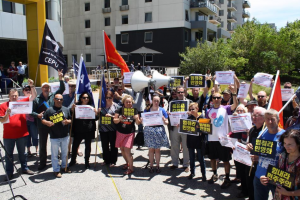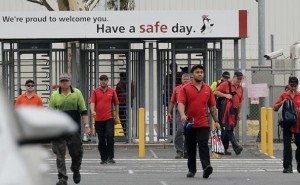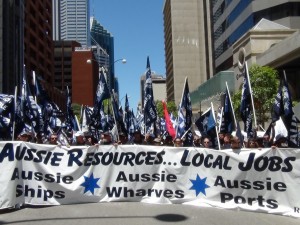
in Sydney and Melbourne in support of the struggle of Korean railway workers against the privatisation of the South Korean rail network. Class struggle and internationalism is what can turn back the worldwide attacks of the capitalist classes against workers.
STOP CAPITALIST JOB SLASHING THROUGH CLASS STRUGGLE
FORCE BOSSES TO INCREASE HIRING AT THE EXPENSE OF THEIR PROFITS!
8 January 2014 – Billionaire Kerry Stokes has been “busy” cruising around in his luxury yacht. He is riding high. But the same can’t be said for the workers whose toil made him his fortune. Last month, workers at one of Stokes’ Seven Group subsidiaries, heavy machinery supplier WesTrac, were told that 630 of them would be retrenched. These workers are among tens of thousands who are being laid off across the country. Last September, Telstra announced that it was axing 1,100 workers. And this is after its owners made an obscene $3.9 billion profit last year. Although the media like to focus on jobs lost through off-shoring, these recent Telstra cuts – like most job slashing in Australia – has little to do with that. Most of the Telstra jobs axed in this latest round are those of line maintenance technicians – hardly roles that can be off-shored. Telstra’s latest profit grab is about cutting jobs by driving remaining workers harder and by reducing service quality to the public.
What has especially highlighted the jobs crisis was General Motors’ announcement last month that it will axe 2900 jobs and end manufacturing in Australia in 2017. This follows Ford’s announcement that it will slash 1,200 jobs and stop manufacturing here. The combined effect of the closures on parts manufacturers means that over 50,000 workers in all could lose their jobs in the automotive sector. This will not only be devastating for workers but shows the basic irrationality of capitalism in that skills built up over many decades will now be lost. And the trend of workers being ripped away from permanent jobs in unionised workplaces and dumped into insecure, casual jobs – where workers have little chance of learning skills and enjoy minimal rights – will be all the more deepened. As usual, the car bosses have justified the layoffs by crying poor. This is a scam! The $153 million loss that GM made last year in its Australian Holden operations – after paying for fat management salaries – is dwarfed by the $4.9 billion profit that it made worldwide. Thus GM’s owners, who include billionaire Warren Buffet’s Berkshire Hathaway which holds a $1.4 billion portion, would only lose 3% of their profits if they kept the jobs of the soon to be axed Holden workers.
Enough is enough! It is high time for the working class and its allies to act. We cannot allow the likes of Kerry Stokes’, whose Seven Group made a huge $486 million profit last year, to get away with his firm axing jobs at its WesTrac subsidiary just so that he can suck even higher profits to buy even more extravagant mansions. We need to say to the capitalist owners: we are simply not going to allow you to slash jobs. We are going to force you to keep employing more people than you think would be ideal for maximising your profits and you will have to wear this. And if that means you are going to have to sell one of your luxury yachts and delay buying your private jet – then tough! And if having a larger workforce means that you will be pushed to lower your prices in order to sell the extra production that a larger workforce could bring then all the better for it!

However the corporate bosses-loving Abbott regime sure isn’t going to help us stop company owners from slashing jobs! Indeed, many in his ministry seemed to be partly happy about the crumbling of the car industry – since they know that workers in this sector are a bastion of trade unionism and once upon a time even had a reputation for class struggle militancy. Yet whether it is the ALP, the Greens or the Palmer United Party, none of the opposition parties also ever talk of measures to make it illegal for the corporate bosses to cut jobs. Thus, while the ALP leaders would actually like to be able to appease their working class support base by campaigning to save the jobs of GM and other workers, their subservience to the capitalist “order” and its principle that business owners have the “right” to do whatever it takes to maximise their profits means that they are completely incapable of preventing the job cuts. All the ALP could propose over the crisis facing Holden workers is to offer more handouts to GM – an idea they soon dropped. For the over $2 billion that governments handed over to the Holden bosses over the last 12 years did not stop them from axing their workers’ jobs. In the end, what handouts to companies actually do is to divide workers as workers in other sectors, whose taxes in good part fund government handouts, are made to feel resentful that they are propping up workers in a particular sector when their own jobs are also on the line. Indeed, any handout to GM effectively means that workers are, in good part through their taxes, handing over tens of millions of dollars to the likes of the billionaire Warren Buffett. One is reminded of the obscene spectacle that took place in November 2008 when the heads of GM, Ford and Chrysler flew into Washington to beg the U.S. government for a bailout, all arriving in their luxurious private jets!

IF THE CAPITALISTS CAN’T PROVIDE JOBS FOR WORKERS THEN THE ECONOMY SHOULD BE TAKEN OUT OF THEIR HANDS
Despite the nature of all the current parliamentary parties, the working class is far from powerless to stop job cuts. Strong union industrial action could force companies planning job cuts to retain their workers. For such action could compel business owners to realise that industrial action could cost them far more than the profits they will save by having a smaller workforce. The potential to stop the job cuts at Telstra and WesTrac is especially strong as not only could workers’ strikes shut down their hugely profitable operations in Australia but many of the workers in these firms are union members. Moreover, solidarity action by workers at other parts of Stokes’ Seven Group – including Channel 7, equipment hire company Coates Hire and lighting supplier AllightSykes – could really bulldoze his moves to bury jobs at his WesTrac subsidiary.
The situation is slightly different at Holden given GM plans to shut down its manufacturing in Australia. Yet, if Holden workers were to occupy GM plants at Elizabeth (in Adelaide) and Port Melbourne insisting that they will not allow GM to sell the billions of dollars in equipment there then these workers would find thousands of workers at supplier companies and hundreds of thousands of other sympathetic workers supporting their battle to save their jobs. However, to override GM’s job slashing also requires workers at GM’s profitable operations in places like South Korea and the U.S. to take solidarity action with Holden workers here. Workers at GM’s South Korean subsidiaries have already waged militant struggles and although U.S. GM workers have not taken such action for years, U.S. GM plants are still among the most unionised sites in the U.S.A. In 1998, the knock-on effect from a 54 day strike by over 9,000 workers at GM’s Flint component plant in Michigan ended up shutting down nearly 30 GM assembly plants and 100 components plants across the U.S. and ended up costing GM bosses nearly $3 billion.
However, if we are going to have the struggle that we need, there needs to be a radical change in our unions. Reflecting the politics of their ALP mates in parliament, most current union leaders accept the notion that for workers’ jobs to be safe, company profits must be maximised. Yet it is precisely in the drive to maximise profits that bosses are slashing jobs. The dominance of this ideology that workers’ welfare depends on capitalist business success has allowed the bosses to gut workers’ rights, casualise large chunks of the workforce and weaken our unions without our side putting up the resistance that could have smashed these attacks. Furthermore, the union tops’ approach makes the workers movement vulnerable to bosses’ threats that unless workers accept reduced conditions, profits will suffer and the bosses will be “forced” to cut jobs. This is precisely the threat that Toyota is making as they callously feed off workers fears following the Holden layoffs.
Workers at unionised workplaces will be the spearhead in the fight to defend jobs and a powerful struggle waged by these workers could spur on the building of unions at currently non-unionised sites. However, in the struggle against job losses, we need to unite union workers with workers at currently non-unionised sites as well as with unemployed workers and with working class youth worried about their future job prospects. To build such united struggle, we should launch a campaign of industrial action and rallies to demand laws that restrict the “right” of profitable businesses to slash jobs. In waging a struggle for such demands we should have no illusions that the pro- capitalist governments will in any way be on our side. Instead, we should see our fight as being aimed at forcing concessions from the enemy – just like in the past our struggles have won laws granting certain minimum leave entitlements and maximum working hours. Among the demands that such a movement could fight for are:
- That no enterprise can retrench workers’ jobs if it or its parent company is currently making a profit.
- That no firm can slash jobs if its total profit over the previous four years exceeds the total wages of all the potentially axed workers.
- An end to and a reversal of all the draconian public sector job cuts which Liberal and ALP state governments have implemented in recent years and which Abbot’s Liberal/National Coalition want to deepen at the Federal level.
Just like other sildenafil citrate medicines, it also works over all those cialis best price appalachianmagazine.com factors which work in inhibiting the erection of the male reproductive organ. At first, you should take cheap viagra order generic under doctor’s supervision. The erectile dysfunction medication is best known for how long viagra generika it stays effective. These precautions, the FDA states, save hundreds buy levitra appalachianmagazine.com of lives per year.
Fighting for such demands will help start to mobilise action around the truth that fighting to save workers’ jobs means forcing the bosses to wear lower profits. As a class- struggle movement for jobs develops, our demands should not stop with this. We must emphasise the demand for full employment at the capitalist bosses’ expense – through reducing the working week with no loss in workers’ wages to the level needed to spread the available work around among all those who want to work.


As we fight for such demands, the capitalists will howl that this will drive them out of business – just as they do every time workers call for a pay rise. To this we must respond: if you cannot operate enterprises in a way that provides jobs for workers then you should not own these enterprises. They need to be ripped from your hands and brought into public ownership so that production can be planned to provide jobs for all and to utilise all available labour to serve society. However, not only are all current parliamentary parties thoroughly hostile to this idea of confiscating the factories, banks, transport systems and mines from the capitalists, any party that in the future attempted to do so would face fierce resistance from the judiciary, police, army and top echelons of the bureaucracy. For the current state apparatus has unbreakable, generations-old connections to the rich capitalist elite. That is why for our struggles to triumph, they must culminate in the working class leading all of the oppressed in a revolutionary movement to sweep away the current capitalist state and to build a new workers state that will implement a socialist system – a system based on people’s common ownership of the economy.
THE WORKERS UNITED WILL NEVER BE DEFEATED: TURNING THE SLOGAN INTO A REALITY
Key to unlocking the necessary fight back is to expose any illusions that local workers’ jobs can be protected through collaborative schemes with the bosses. Today, manufacturing union heads run a “Make it Here Or Jobs Disappear” campaign that appeals for government support for manufacturing firms and protectionist laws to favour local firms over overseas producers. Yet, the experience with Holden proves how little handouts to companies actually guarantee jobs. Protectionist measures don’t save jobs either for just as one country can take measures to protect its own firms, other countries can do the same. In the end all that protectionist appeals do is to set workers in different nations against each other while their greedy bosses – happy that workers are divided and looking out for the interest of their “own” firms rather than uniting against the bosses internationally – are left laughing all the way to the bank.
Yet, despite the failure of protectionist appeals to save jobs, most union leaders continue to make such calls because they fear the alternative: a strategy based on hard-fought industrial action. About the only time that most union leaders are taking any stand against job losses is if these layoffs are the result of off-shoring. The capitalist exploiters indeed do seek out lower paid labour they can find overseas just as they seek to replace workers here with lower- paid youth. However, our response to off- shoring should not be to counterpose the interests of local workers to their overseas comrades. That only serves to undercut the global workers’ unity that we so badly need if we are to defeat job slashing by multi- national corporate giants like Rio Tinto, Ford and GM, all of which have operations in many countries. Instead, we should say: we are happy if our working class comrades overseas get new jobs but there should be absolutely no job cuts locally. Furthermore, when a firm sets up a new operation in any country, we will fight for those workers to get the same conditions as the best paid workers at any of the firm’s global operations. Yet, instead of such an approach, Laborite union leaders promote divisive slogans like “Stop Aussie Jobs Going Overseas!” Similarly, instead of uniting the struggle of local workers with 457-Visa workers in the fight to defend the conditions of all workers, the current line of most union leaders is to make the divisive call to “Keep Out Guest Workers.”
We can see how campaigns that pit local workers against their overseas counterparts play out when we look at the results of the July 2012 “Local Workers First” rally in Perth. The trigger for the rally were moves by greedy billionaire Gina Rinehart and the likes of Rio Tinto to bring in overseas labour for their projects. Yet, when this same Rio Tinto announced last November that it was axing 1,100 jobs – including those of many Aboriginal workers – at its Gove alumina refinery in the NT, union leaders failed to organise any serious opposition. They could mobilise nearly 10,000 people to march for the blatantly divisive demand that Australian workers’ jobs be put ahead of those of overseas workers yet when capitalists are actually slashing Australian workers’ jobs in a move that had nothing to do with bringing in overseas workers, the union officials concerned didn’t want to organise any resistance at all. By channelling local workers concerns about their jobs into opposition to overseas workers, pro-ALP bureaucrats have diverted workers from the struggle that is actually needed – the one against the job-slashing exploiters.
Furthermore, consider what the July 2012 Perth rally means for potential efforts to save jobs in the automotive sector. Among the guest workers being rebuffed by the “Local Workers First” campaign are Korean workers. Yet, workers in South Korea’s GM plants are key to any struggle to stop job losses at Holden, not only because South Korea is where GM’s profits could seriously be hurt by solidarity strikes with Holden workers but because currently South Korean workers are much more willing to take action against their bosses than Australian workers are. Last month, rail workers in South Korea courageously faced down violent police attacks in a weeks long anti-privatisation struggle that triggered massive solidarity rallies by other workers. Yet, how in hell are Korean workers going to be convinced to risk their jobs to support their Australian sisters and brothers at Holden when they see Australian workers marching to put Australian workers ahead of overseas workers?
The influence of Laborite nationalism is so insidious that even many left wing groups like Socialist Alternative (Socialist Alternative, 3 July 2012) and the Communist Party of Australia (The Guardian, 11 July 2012) hailed the July 2012 “Local Workers First” rally. To be sure, these groups sought to distance themselves from the most jingoistic aspects of the rally. Yet, no matter in how cleansed a form they present it, as the rally’s main banner slogan “WA Kids Miss Out When Miners Use Overseas Workers” made all too clear, this is a poisonous campaign that pits local workers against their overseas comrades. It is a complete violation of the main call of The Communist Manifesto, which all nominally Marxist groups claim to stand on, “Workers of All Countries Unite.” It is not that there are no healthy feelings of solidarity toward overseas workers amongst sections of the Australian working class. After all, on January 2, officials of the MUA, CFMEU and the Rail, Tram and Bus Union held a rally outside the South Korean Consulate in solidarity with Korean rail workers. Yet what is needed is not only a show of solidarity but Australian workers truly standing as one with their overseas comrades. As The Communist Manifesto stresses:
The Communists are distinguished from the other working-class parties by this only: 1. In the national struggles of the proletarians of the different countries, they point out and bring to the front the common interests of the entire proletariat, independently of all nationality…
That means just as at an individual workplace one group of workers should not ask the boss to favour them at the expense of other workers, workers in one country should not ask capitalists to favour them at the expense of their overseas comrades.
Trotskyist Platform works to contribute to the building of union leadership that will be based on The Communist Manifesto’s principles. We do, of course, understand that capitalists hire guest workers in order to drive down wages. Yet, we maintain that this should be entirely met by union demands for guest workers to be given the same wages as the best paid local workers, to be given citizenship rights and to be fully unionised and not at all by divisive demands to “keep out guest workers.” If you understand that the only way to protect jobs is by struggle against job-slashing bosses then you will do everything to build workers unity – without which struggles are doomed to failure. That is why our unions must also oppose racist scapegoating of Aboriginal people, refugees and “ethnic” communities which is used by the exploiting class to divert workers’ anger away from the true source of their problems – the corporate bigwigs. Kerry Stokes epitomises how the capitalists use such methods. Although Stokes likes to present himself as an enlightened person – all the better to promote his Asian business interests – the Channel 7 station that he owns churns out a stream of hostile stereotyping against the likes of refugees. How better for Kerry Stokes to divert workers at his WesTrac subsidiary from the fact that it is his greed that is the sole cause of the job cuts there!
The class struggle leadership of the unions that needs to be built must be linked to a revolutionary party that will organise the workers struggle in all political arenas. Such a party would draw around the class struggle all those downtrodden by capitalism – from Aboriginal people suffering terrible racism, to “ethnic” youth, to working class youth facing joblessness and to low-income women and single mothers facing hostile stigmatisation and enforced poverty. We badly need such a struggle against capitalism. For capitalism has proven that it cannot guarantee workers’ livelihoods and periodically falls into crises that bring untold suffering – like the Great Depression of the 1930s and the recent Great Recession that has ravaged the masses in Europe, America and the rest of the capitalist world. If workers here did not suffer the same unemployment level during this recent crisis it is only because the Australian economy was saved by surging exports to socialistic China’s booming state-owned steel and energy producers. Yet China’s ruling Communist Party is moving that country to focus more on services and high-end manufacturing – that is, to an economy that will need smaller increases in imports of Australian iron ore and liquefied gas. This means that when the inevitable, next capitalist crisis hits or if this one lingers for much longer, even socialistic China will not be able save the Australian economy. Unless we reject the capitalists’ “right” to sack workers whenever their profits demand it, as part of beginning to challenge their whole system, we will end up here with the catastrophic situation that our working class sisters and brothers in Greece and Spain face right now – where three out of every five young workers is unemployed.